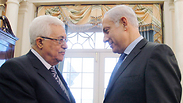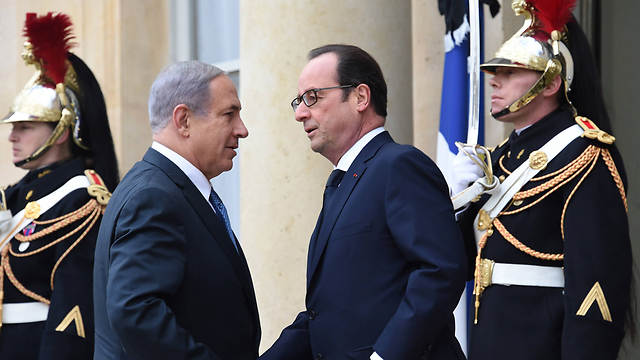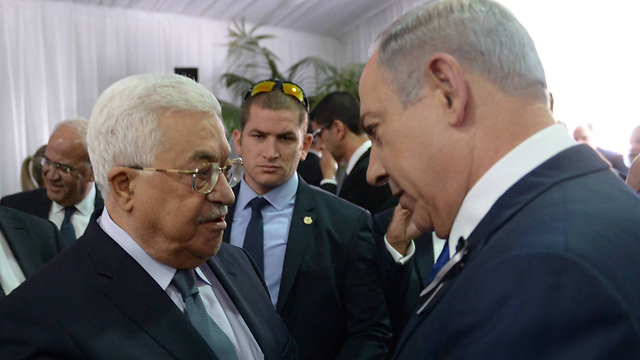

Netanyahu to Hollande: I will meet Abbas in Paris without peace conference
Prime minister told France’s President Hollande that he would fly to Paris to talk directly with Mahmoud Abbas but not under the parameters of the French-initiated international peace conference; commentators posit possible French withdrawal from initiative can be attributed to Donald Trump’s election and Obama’s indifference.
Netanyahu’s suggestion was made as an alternative to the French-initiated international peace conference, in which the Israeli prime minister has already announced his country’s refusal to participate, based on the premise that “it will not contribute to peace.”
If the conference did not take place, Netanyahu told Hollande that he would fly to the French capital to meet with Abbas without preconditions—a long-held line espoused by the Israeli premier.
Last month, a number of Western diplomats told Arab media outlets that the election of Donald Trump to the US presidency nudged France into retreating from the initiative, which was set to take place before the year’s end.
Despite the claims, however, Abbas advisor Husam Zomlot, who is slated to become the the next Palestinian ambassador to the United States, said that Élysée Palace and the French president already confirmed the date on which the international peace conference would take place, and that Paris was already setting the wheels in motion to bringing about its implementation.
The remarks of the Western diplomats came after different reports claiming that France decided to temporarily abort the initiative following heavy international and Israeli pressure.
According to the diplomats, the French decision, which has yet to have been officially confirmed, mainly stems from the election of President-elect Donald Trump, but also the general indifference displayed by the current US administration.
Paris has remained determined to stage the conference. It believes that bringing the two leaders to meet with Hollande a day after the conference would be a way of circumventing Israeli accusations that the French initiative aims to impose a multilateral solution.
France has repeatedly tried to breathe new life into the Israeli-Palestinian peace process this year, holding a preliminary conference in June where the United Nations, European Union, United States and major Arab countries gathered to discuss proposals without the Israelis or Palestinians present. The conference of foreign ministers was aimed at agreeing on a joint statement that would reaffirm the two-state solution on the basis of pre-1967 borders and according to Security Council resolutions, diplomats said.
"We have to recreate the conditions for a two-state solution and we are determined more than ever to do everything to implement our initiative. The sooner the better," Ayrault told reporters at a news conference with his Spanish counterpart, Alfonso Dastis.
Ayrault confirmed that invitations had been sent to Netanyahu and Abbas to attend a face-to-face meeting. Diplomats said that Hollande was also planning to call US President Barack Obama to discuss the issue.
Abbas spokesman Nabil Abu Rdainah said the Palestinians welcomed "any French effort to salvage the faltering political process."
The last, US-backed talks ended in failure in April 2014, and the outgoing US administration appears unwilling to tackle the issue before President-elect Donald Trump takes over in January.
With Obama wary of being seen picking a fight at a time when he hopes to persuade Trump to preserve parts of his legacy, including the Iran nuclear deal, Obamacare and the opening to Cuba, it is not clear whether the United States will attend a new meeting in Paris.
In New York, diplomats at the United Nations said Arab state ministers were due to meet next week to discuss a Palestinian push for a UN resolution on settlements and were likely to decide the content of a draft text and when it would be circulated to the Security Council.
Diplomats said New Zealand was also working on a draft UN resolution on the Middle East peace process that would reaffirm the Security Council's commitment to a two-state solution.

















